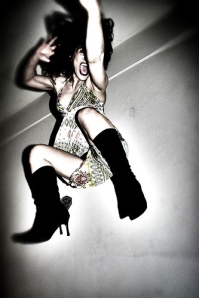A Woman Without Her Neighborhood { 5 }
By this point Ginnie had had enough. She was as lost as he was and she did not want to find she had any more in common with this man than she had to admit.
But then he said, “Two words: Sorry and Crazy. I took those two words out of language because they were used so much and they just beat humanity down. But once I took those words out nothing worked. Nothing worked at all. People were dropping like anchors. So I had to put them back in and when I did, it changed. Now those two words heal us instead of hurt us. They gave me a shot and looked inside my brain. There’s a beautiful horse. They looked inside my brain and what they found was a nightmare. But it was beautiful and calm, a big spacial space. Lots of stars. But I just got a new face in LA and it will be all right. They aren’t trying to kill me anymore. You know that documentary about Bosnia on PBS?”
Ginnie’s mouth felt frozen but she formed the shape of the word no.
“Well I can’t really watch that. I made that and that’s my hysteria. I can’t watch it. What is your name? I have more names than Carter had pills, you know what I mean. I have so many names. But I’m the highest with three names. My name is also John David _____ ”
But Ginnie couldn’t understand what the third name was. She wanted to ask him to repeat it, but she couldn’t seem to speak. She had gravel in her belly that stopped her from asking. What was the third name? It sounded like Idem or Edim. Or was it Odlar? And finally she recognized him. She really did know him. He was a Tompkins Square bum, all the way out here from New York. Here, wherever here was. There he was a yeller. He yelled about having the freedom to yell. He yelled at dogs and women. He had yelled at her once, she couldn’t be mistaken. She could not be mistaken. Sorry Crazy, she repeated. Sorry. Crazy. Sorry Crazy. The sound of those words, the sound of this man saying those words. It was all a distant life. Another life. Her life. It was the rhythm of the jigsaw puzzle buildings and the scummy people with bags under their eyes and the faint accent of no-place and the ancient burial grounds of the sidewalk grooves and the forgotten strata of smells, the dank smells that hinged on one another. Towering smells and words. Those words were the rhythm of her city and she remembered the winds carving the buildings and the fleshy streets that took her home. The same streets that got her lost. The gritty gray. Whip-whipping wind and city seagulls above her head.
“Don’t cry, lady. Don’t cry,” John David Something said. “I know you have to go. We’ll part here.” Ginnie nodded, blurry-eyed. “Can I give you a kiss?” Before she could answer he kissed her cheek. She had let him get that close. But she didn’t cringe. She didn’t move at all. “I’m going to give you a hug.” He hugged her and bolted away in one unbroken movement. “Just remember!” And he ran toward the forest, waving behind him and skipping, leaving her alone. It was just her now and she knelt at the lip of the lake and wept, stripped. Dewy knees. The upside-down trees, the blanket of leaves veiling the trout in the murky water.
When she left she was shaking with spongy joy. Her skin and senses were fluid. She flew over old sewn farms. Ginnie came back when the leaf-peepers and their threadbare love were leaving.
![]()
The last I heard, Ginnie was dating a man who said sorry to the insects he had to kill in their Bushwick apartment where she resumed her campaign against condominiums. The cult was forgotten but the rules may have stuck just the same. She found another old brick building and another community. They tore down our building brick by brick, because of the asbestos, and she watched and one day she even bought one of the construction workers a tea because he was coughing uncontrollably. She didn’t stay fluid; she reached her hand back and statued again. But maybe she was soft pumice now, not marble and cold, and she still shook with love from time to time.
I moved out just before Ginnie’s return. Mango helped me. She had moved to the island, somewhere in Chelsea. The scaffolding was already up and kept the rain off us as we lugged boxes empty then full to and from our old place. I left Ginnie empty boxes, feeling her return before it happened, feeling that she might need to pack up though she didn’t leave much, except her hat, which I took. I moved in with Holly’s parents in Long Island. Winter was cold on the water and I wore Ginnie’s hat even though Holly’s parents finally gave me all of Holly’s articles. They gave me everything by storing it in my room and saying they didn’t need it, even her bras.
I am not so much here as I am not-there, on walks along the beach. Ginnie, I still have your hat and it is filled with shells. Sometimes it’s filled to the brim and I’ll have to discard some out of necessity. I don’t really need them. I’ll usually forget the ocean. The ocean and I don’t plague one another with an overstated presence. Sometimes I’ll forget the waves and jump when I realize them, as if someone were yelling at me. A woman without her neighborhood is savage.
© 2007 CARMIEL BANASKY

 {
{